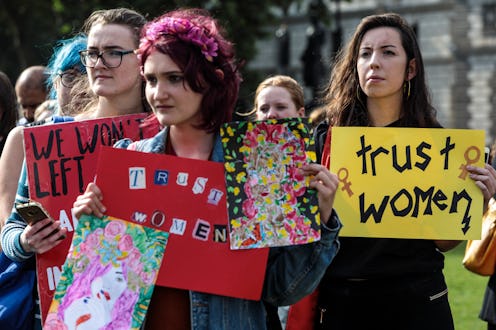News
This New Helpline Will Answer All Your Legal Questions About Self-Managed Abortion

As abortion access in the U.S. has become increasingly restricted, more Americans have turned to self-managed abortions, such as those induced by abortion pills. In order to help people concerned about navigating the legality of terminating their pregnancies themselves, a team of lawyers launched an abortion helpline on Tuesday that aims to serve as a free and confidential resource.
The SIA Legal Team, which works to give people increased self-determination in their reproductive lives, is behind the helpline (844-868-2812) and website. Jill Adams, the group's founder and strategy director, tells Bustle the helpline is designed for "anyone who has ended their own pregnancy and been questioned by the authorities or fears they might be questioned by the authorities in relation to their abortion."
"The gap we’re aiming to fill is around access to justice," Adams tells Bustle. "We are hoping to be able to better protect and defend those who are criminalized for ending their own pregnancies."
Adams hopes the helpline will help people understand their rights surrounding self-managed abortion, and connect them to legal representation when needed. It will not, however, provide any medical counsel or tell people how to self-manage abortions.
As Adams points out, self-managed abortions are at risk of becoming increasingly criminalized, which could disproportionately impact people of color, low-income people, and others who face significant barriers to reproductive health care access.
Criminalizing self-managed abortions could have severe consequences, says Dr. Abigail Aiken, an assistant professor of public affairs at the University of Texas at Austin. Only seven states currently have laws that explicitly criminalize self-managed abortions, but Aiken says that people in other states can and are still prosecuted for terminating their own pregnancies.
In 2015, for example, a woman in Indiana, Purvi Patel, was sentenced to 20 years in prison after inducing her own abortion, though she was ultimately released the following year after her feticide conviction was overturned. As a result, Aiken notes that having a right to an abortion is not the same thing as being able to access one.
"That post-Roe world that everyone is right to worry about is — for many, many people — already their reality," Aiken tells Bustle, "because their right to choose exists but they can't fulfill that right without proper access."
According to both Adams and Aiken, self-managed abortions have had a significant impact in making reproductive health care more accessible, especially for communities who face the greatest hurdles in obtaining it.
"Self-managed abortion holds the potential to increase access to abortion for the very populations that face insurmountable obstacles to care, and it holds the potential to protect their privacy and uphold their dignity," Adams tells Bustle, "which is particularly important for those who face compound forms of discrimination."
This, Aiken says, is precisely why criminalizing self-managed abortions would be harmful. Allowing pregnant people to terminate their own pregnancies — especially when they cannot afford to visit a clinic, or when they would have to travel long distances to do so — is a "democratizing force," Aiken says.
Abortion pills have been found to be both safe and effective, and attempting to criminalize them would likely render self-managed abortions unsafe — just as outlawing abortion itself would, as reports from the World Health Organization have indicated.
"If abortion is not available or acceptable, people are going to try to find ways to take care of this on their own," Aiken says.
Aid Access is a prominent example of the phenomenon Aiken describes. Launched by Dr. Rebecca Gomperts, Aid Access is similar to Women on Web, a service that shipped abortion pills to other countries, but not to the U.S. Before this year's referendum in Ireland overturned the country's abortion ban, Women on Web was able to get abortion pills to pregnant Irish people who sought abortions. Aid Access distributes abortion pills to the U.S. for $95, which can be more affordable for those who cannot access in-clinic care.
As Adams and Aiken both point out, people seeking abortions in the U.S. face a growing number of hurdles. The 42-year-old Hyde Amendment still prohibits federal Medicaid funding from being used for abortion services, and the FDA is currently investigating Aid Access because it is not considered an authorized provider of abortion pills. According to Aiken, attempts to outlaw certain forms of abortion — particularly self-managed abortion — are risky "because it isolates people," and discourages them from seeking help when they need it.
This is one of the gaps that the SIA Legal Team's helpline is attempting to fill, Adams says. If people are worried about the legal ramifications of self-managing an abortion, they can call the helpline to learn more about laws in their states and about their rights. This helpline is also part of the legal team's effort to normalize self-managed abortions, Adams says.
"People have been managing their own fertility and ending their own pregnancies throughout the globe since the dawn of time," Adams tells Bustle. "This is not new. This is not revolutionary."